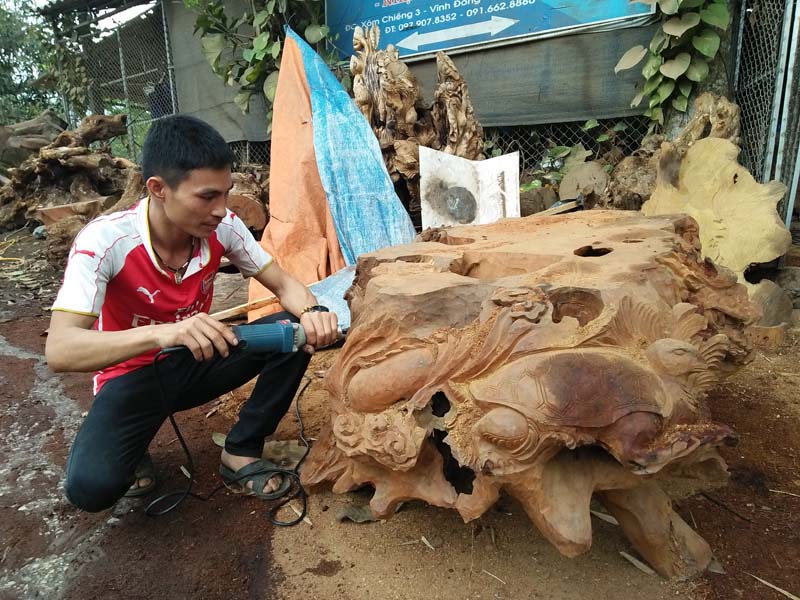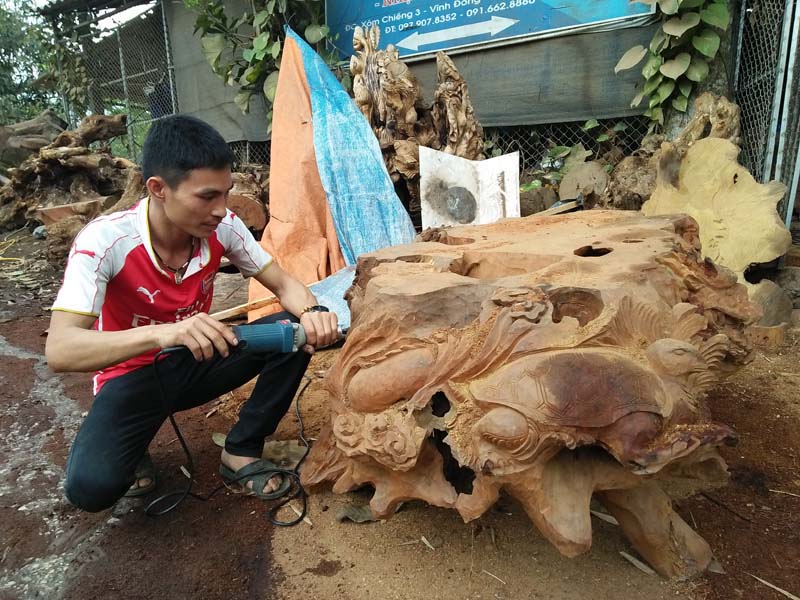
(HBO) - With skilful hands, creativity, and especially a passion for carving, Bui Van Tu, a young man in Chieng 3 village, Vinh Dong commune, Kim Boi district of Hoa Binh has created unique wood products with high artistic values.
![]()

Carving
works of Bui Van Tu, which are exquisite and beautifully crafted, win the heart
of customers.
Graduating from high school in 2002, Tu chose
not to go to university and enrolled in Ha Nam Intermediate Vocational School
(now Ha Nam Vocational College), where he learned carving.
After many years of studying and working at the
same time, he earned some money and decided to return to his hometown to start
his career. In 2010, he rent land to open a wood carving shop under the name Tu
Tam. He borrowed capital to invest in machinery, and searched for materials
supply sources by himself. Initially, due to a lack of new and diverse designs,
the workshop did not draw many customers. However, he did not give up. He spent
time to find new ideas to produce unique products and diversify designs. Thanks
to the efforts, more and more customers came to Tu’s workshop to place their
orders.
On average, his workshop has between 20 and 30
orders per month. The products are also diverse, depending on the requirements
of customers. Prices of the products also varies from several millions VND to
hundreds of millions of VND. A statue of Maitreya or the Goddess of Mercy may
cost from 40-50 million VND, while a salon carved from an old tree stump can be
priced at 150 million VND. Each year, his workshop completes than 200 orders
for customers in and outside the province, earning a monthly income of 30-35
million VND.
Tu said that so far, he has trained many youngsters
in the commune and neighbouring areas in wood carving, while creating stable
jobs for 5-7 skilled workers with a wage from 4.5-8 million VND per month.
"In the coming time, I hope to
expand the workshop to further develop the trade,” said Tu.
In order to further develop the workshop and establish
a position in the market, thus creating jobs for more labourers, in recent
years, Bui Van Tu has learnt new designs through the media to put into
production, meeting the demand of customers. Therefore, "Tu Tam” carving
products can satisfy even choosy customers./.
According to data from the Hoa Binh Provincial Party Committee, the industrial production index for the first six months of 2025 is estimated to have increased by 20% compared to the same period last year. This marks the highest year-on-year growth rate for this period since 2020.
In the first six months of 2025, Hoa Binh province’s export turnover was estimated at 1.145 billion USD, marking an 18.11% increase compared to the same period in 2024. Import turnover was estimated at $ 804 million, a 17.15% increase, which helped the province maintain a positive trade balance.
The lives of the ethnic minority farmers in Tan Lac district have gradually improved thanks to the new directions in agricultural production. This is a testament to the collective strength fostered through the professional associations and groups implemented by various levels of the district’s Farmers’ Union.
With the motto the "product quality comes first,” after nearly one year of establishment and operation, Muong village’s Clean Food Agricultural and Commercial Cooperative, located in Cau Hamlet, Hung Son Commune (Kim Boi district), has launched reputable, high-quality agricultural products to the market that are well-received by consumers. The products such as Muong village’s pork sausage, salt-cured chicken, and salt-cured pork hocks have gradually carved out a place in the market and they are on the path to obtaining the OCOP certification.
In the past, the phrase "bumper harvest, rock-bottom prices" was a familiar refrain for Vietnamese farmers engaged in fragmented, small-scale agriculture. But today, a new spirit is emerging across rural areas of Hoa Binh province - one of collaboration, organisation, and collective economic models that provide a stable foundation for production.
Maintaining growing area codes and packing facility codes in accordance with regulations is a mandatory requirement for agricultural products to be eligible for export. Recently, the Department of Agriculture and Environment of Hoa Binh province has intensified technical supervision of designated farming areas and packing facilities to safeguard the "green passport" that enables its products to access international markets.



